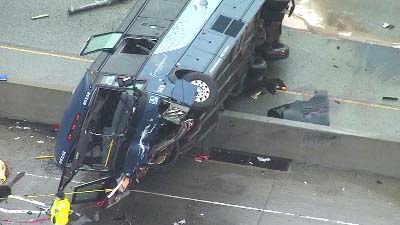
Reuters, Arlington :
US traffic deaths jumped 10.4 percent in the first six months of 2016 to a “crisis” level, the U.S. National Highway Traffic Safety Administration (NHTSA) said on Wednesday.
NHTSA said road deaths in the first half totaled 17,775 and said the number was likely to be higher in the second half due to warmer weather and seasonal driving.
The jump in the first half of the year follows a spike in 2015, when road deaths rose 7.2 percent to 35,092, the highest full-year increase since 1966. NHTSA Administrator Mark Rosekind called the rising deaths a “crisis” and urged swift actions to reverse the rising trend after years of declines.
The U.S. Transportations Department said it believes it “is now increasingly likely that the vision of zero deaths and serious injuries can be achieved in the next 30 years.”
The U.S. Transportation Department said vehicle miles driven rose 3.3 percent in the first half of 2016. The fatality rate in the first half of the year has risen to its highest since 2009, NHTSA said.
Last year, total U.S. traffic crashes rose by 4 percent to 6.3 million, while people injured rose 4.5 percent to 2.44 million.
Much of the increase in 2015 was driven by a jump in pedestrian, motorcycle, and bicycle deaths, NHTSA said. Rosekind and other policy makers at an event outside Washington called for a goal of reaching “zero road deaths” within 30 years.
Many American cities have adopted similar “Vision Zero” programs. Sweden first adopted a “Vision Zero” strategy in 1997 and has seen a sharp reduction in road deaths.
NHTSA plans to bring other federal agencies and safety groups together to work on more concrete plans over the next year or more to roll out a vision of zero road deaths, including addressing road design and speed limits.
With human error accounting for 94 percent of crashes, officials acknowledge self-driving vehicles and other automated vehicle systems will be necessary to meet the goal.
NHTSA said in a study released in 2014 that the annual societal costs of U.S. traffic crashes is $836 billion in economic loss and societal harm.
In April, the United Nations General Assembly backed a plan to create a Road Safety Trust Fund to support efforts to reduce traffic deaths. Road crashes kill more than 1.25 million people and injure as many as 50 million people a year globally, the United Nations said.
US traffic deaths jumped 10.4 percent in the first six months of 2016 to a “crisis” level, the U.S. National Highway Traffic Safety Administration (NHTSA) said on Wednesday.
NHTSA said road deaths in the first half totaled 17,775 and said the number was likely to be higher in the second half due to warmer weather and seasonal driving.
The jump in the first half of the year follows a spike in 2015, when road deaths rose 7.2 percent to 35,092, the highest full-year increase since 1966. NHTSA Administrator Mark Rosekind called the rising deaths a “crisis” and urged swift actions to reverse the rising trend after years of declines.
The U.S. Transportations Department said it believes it “is now increasingly likely that the vision of zero deaths and serious injuries can be achieved in the next 30 years.”
The U.S. Transportation Department said vehicle miles driven rose 3.3 percent in the first half of 2016. The fatality rate in the first half of the year has risen to its highest since 2009, NHTSA said.
Last year, total U.S. traffic crashes rose by 4 percent to 6.3 million, while people injured rose 4.5 percent to 2.44 million.
Much of the increase in 2015 was driven by a jump in pedestrian, motorcycle, and bicycle deaths, NHTSA said. Rosekind and other policy makers at an event outside Washington called for a goal of reaching “zero road deaths” within 30 years.
Many American cities have adopted similar “Vision Zero” programs. Sweden first adopted a “Vision Zero” strategy in 1997 and has seen a sharp reduction in road deaths.
NHTSA plans to bring other federal agencies and safety groups together to work on more concrete plans over the next year or more to roll out a vision of zero road deaths, including addressing road design and speed limits.
With human error accounting for 94 percent of crashes, officials acknowledge self-driving vehicles and other automated vehicle systems will be necessary to meet the goal.
NHTSA said in a study released in 2014 that the annual societal costs of U.S. traffic crashes is $836 billion in economic loss and societal harm.
In April, the United Nations General Assembly backed a plan to create a Road Safety Trust Fund to support efforts to reduce traffic deaths. Road crashes kill more than 1.25 million people and injure as many as 50 million people a year globally, the United Nations said.

